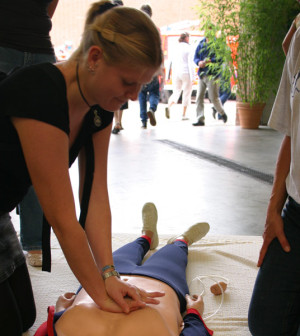- Could Your Grocery Store Meat Be Causing Recurring UTIs?
- Are You Making This Expensive Thermostat Error This Winter?
- Recognizing the Signs of Hypothyroidism
- 10 Strategies to Overcome Insomnia
- Could Artificial Sweeteners Be Aging the Brain Faster?
- Techniques for Soothing Your Nervous System
- Does the Water in Your House Smell Funny? Here’s Why
- Can a Daily Dose of Apple Cider Vinegar Actually Aid Weight Loss?
- 6 Health Beverages That Can Actually Spike Your Blood Sugar
- Treatment Options for Social Anxiety Disorder
Device Approved to Prevent Second Strokes in Certain Heart Patients

The Amplatzer PFO Occluder device has been approved by the U.S. Food and Drug Administration to prevent another stroke among people who had at least one prior stroke involving a PFO (patent foramen avale).
A PFO is a small hole in the heart that could allow passage of a blood clot.
Up to 30 percent of Americans have a PFO, the FDA explained in a news release. The condition typically causes no health issues and doesn’t require treatment.
However, in a small number of cases, the PFO provides “a path for a blood clot to travel to the brain where it [blocks] a blood vessel resulting in a stroke,” the agency added.
The new device is inserted via a catheter in a leg vein and is advanced to the heart.
It was FDA approved nearly a decade ago, but its manufacturer withdrew the application for approval after the agency told the manufacturer that more than 4,000 people could be eligible for the device, making the device ineligible for the agency’s humanitarian device exemption.
The new approval followed clinical testing of the device’s safety and effectiveness among more than 900 participants, aged 18 to 60 years. Those who used the device plus blood-thinning medication were 50 percent less likely to have a new stroke, compared with those who took blood-thinning medication alone, the FDA said.
Potential side effects of the device include heart injury, irregular heart rate or blood clot at the implant site. People with abnormal connections between the heart’s chambers or in whom unusual cardiovascular anatomy might inhibit the device’s implantation shouldn’t use the device, the FDA said.
The device is produced by St Jude Medical, based in Plymouth, Minn.
More information
To learn more, visit the FDA.
Source: HealthDay
Copyright © 2026 HealthDay. All rights reserved.










